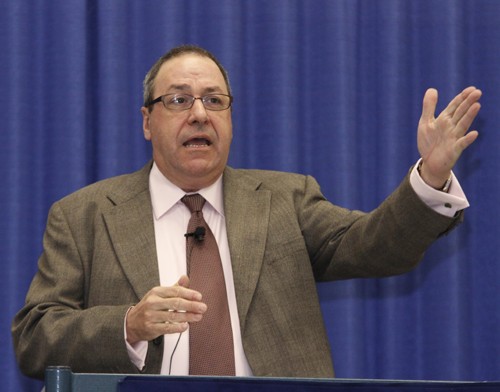New York Times economic columnist Joe Nocera spoke at the James E. Rogers College of Law on Monday afternoon about three lessons that can be learned from the recent financial crisis.
The Ares Auditorium, in the James E. Rogers College of Law, was packed with more than 120 people coming to listen to Nocera’s expertise.
Nocera began by answering the question on everyone’s mind — can the financial crisis happen again?
“”Yes it can happen again and it will happen again, I can guarantee it,”” Nocera said. And anyone who claims it can be avoided “”you are authorized to roll your eyes at.””
Lesson 1: Figure it out yourself.
People who survived the Great Depression spent their money with that experience in the back of their minds, Nocera said. Now, 80 years later, the “”memory fades and we forget what can happen.””
“”Your mother can tell you that you should save rather than spend. It doesn’t matter, you have to learn for yourself,”” Nocera said.
Nocera related the financial crisis to science and sex.
“”Take science. It builds on a foundation, and every new discovery is added to the foundation and builds on it. Discoveries in the 1970s are still part of the building blocks for 2009,”” Nocera said.
“”Sex isn’t like that. You have to make all your own mistakes; you have to figure it out for yourself. And finance is like that.””
Lesson 2: It wasn’t that hard to see it coming.
“”You had to lose your mind to get caught up in what was going on both on Main Street with housing and on Wall Street with derivatives,”” Nocera said. “”The madness is really quite powerful.””
Similar to the Great Depression, most people missed the obvious signs that this crisis was coming but a few people did take notice.
In December 2006, the peak of the housing market bubble, Lewis Ranieri and other members of the panel at the Office of Thrift Supervision discussed the housing market, because “”they were getting a little nervous.””
Fannie Mae and Freddie Mac were the gatekeepers of finances in the United States, “”they acted as a form of control, and this has gotten pushed aside completely.””
“”In the past, the investors could understand and have faith in the underlying value of mortgage-backed securities but not anymore,”” Nocera said. “”Today the transparency of the past has been obscured by a multitude of products. There is the crisis in a nutshell.””
Edward Gramlich, with the Federal Reserve, was very concerned with the state of the economy in America and went to Alan Greenspan, the former U.S. Federal Reserve chairman, before the collapse, but was scoffed at.
“”It wasn’t a secret,”” Nocera said. “”AIG stopped writing credit default swaps in 2006 because they saw the underlying securities were problematic. That just blows my mind.””
Lesson 3: In every level of financial society, there was a race to the bottom.
“”There was a diminution of standards, things that used to matter to an investor stopped mattering,”” Nocera said.
Companies began competing by offering loans that were far too risky because “”they didn’t want to lose their power in the marketplace in January 2008.””
But the blame doesn’t fall on the companies alone, Nocera said.
“”We spend all our time gnashing our teeth at Wall Street but homeowners didn’t do smart things either,”” Nocera said. “”Who in their right mind buys a home with no money down and can’t afford to pay the first mortgage payment?””
In the end, it comes down to the age-old question, which came first the chicken or the egg? Or in this case, company or personal financial ruin?
To get out of this economic slump “”we need to stop trying to spend our way out of depression,”” Nocera said.
“”We need a national reset where every level of society spends less and goes into less debt,”” he said. “”But no one is thinking about how to unwind the spending.””
His advice to students is “”to act in their own best economic interest.””
“”Pay down your home equity loan, don’t pile up credit card debt, the government should not be encouraging people to spend right now because that kind of behavior isn’t sustainable,”” Nocera said.









